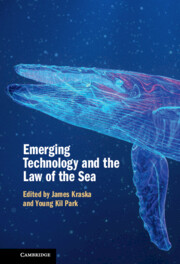Book contents
- Emerging Technology and the Law of the Sea
- Emerging Technology and the Law of the Sea
- Copyright page
- Contents
- Contributors
- Preface
- 1 Emerging Technology and Maritime Boundary Dispute Resolution
- 2 Renewable Energy and the Law of the Sea
- 3 Striking an Equitable Balance under the Biodiversity Agreement
- 4 Small Modular Reactors and Transportable Nuclear Power Plants
- 5 Shipping, Distributed Ledgers and Private Maritime Law
- 6 Maritime Cyber Security
- 7 International Standards for Hull Inspection and Maintenance of Robotics and Autonomous Systems
- 8 Functionalism and Maritime Autonomous Surface Ships
- 9 Artificial Intelligence to Facilitate Safe Navigation of Ships
- 10 Unmanned and Autonomous Warships and Military Aircraft
- 11 Seabed Technology and Naval Operations on the Continental Shelf
- Index
5 - Shipping, Distributed Ledgers and Private Maritime Law
Published online by Cambridge University Press: 07 July 2022
- Emerging Technology and the Law of the Sea
- Emerging Technology and the Law of the Sea
- Copyright page
- Contents
- Contributors
- Preface
- 1 Emerging Technology and Maritime Boundary Dispute Resolution
- 2 Renewable Energy and the Law of the Sea
- 3 Striking an Equitable Balance under the Biodiversity Agreement
- 4 Small Modular Reactors and Transportable Nuclear Power Plants
- 5 Shipping, Distributed Ledgers and Private Maritime Law
- 6 Maritime Cyber Security
- 7 International Standards for Hull Inspection and Maintenance of Robotics and Autonomous Systems
- 8 Functionalism and Maritime Autonomous Surface Ships
- 9 Artificial Intelligence to Facilitate Safe Navigation of Ships
- 10 Unmanned and Autonomous Warships and Military Aircraft
- 11 Seabed Technology and Naval Operations on the Continental Shelf
- Index
Summary
This chapter discusses the possible impact of blockchain or distributed ledger technology on private maritime law in the near to mid future. It suggests that tamperproof logs are likely to be relevant in four areas. These are (1) shipping documentation (especially negotiable documents of title); (2) payment in connection with letters of credit governed by the eUCP 2.0 and similar transactions; (3) cargo care and monitoring, especially in connection with claims between buyers and sellers, cargo claims against carriers, and possibly dangerous cargo suits against shippers; and (4) the monitoring of vessels themselves with a view to establishing the cause of casualties, a matter relevant in particular to charter disputes, insurance and collision claims. In all of these areas the use of distributed ledgers is likely to give rise to substantial savings in evidence-gathering and litigation costs, leading to the smoother and more efficient handling of claims.
- Type
- Chapter
- Information
- Emerging Technology and the Law of the Sea , pp. 141 - 157Publisher: Cambridge University PressPrint publication year: 2022

